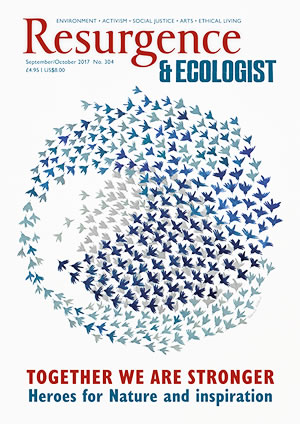Paul Kingsnorth is obsessed with the endings of worlds. In his stunning debut novel, The Wake, he transports us to the aftermath of 1066 to follow a guerrilla gang of Anglo-Saxons resisting the Norman Conquest. He examines their leader Buccmaster’s attempt to situate himself in a new world, where all certainties have suddenly been obliterated. It is easy to read the story as a loose parallel of an impending ecological collapse, the English landscape of the 11th century eerily echoing the terrain of something like Cormac McCarthy’s The Road, with all the attendant psychological anguish.
Confessions of a Recovering Environmentalist, a collection of essays, puts analogies aside and faces ecological collapse head on. If you want to talk about worlds ending, this is the big one. I’m sure I don’t need to rehearse the list of impending crises we’re facing, but, as Kingsnorth himself puts it, “This is new. This is bigger than anything there has ever been for as long as humans have existed, and we have done it, and now we are going to have to live through it, if we can.”
Kingsnorth’s maddening and compelling essays explore two central insights. The first is that there is – in Kingsnorth’s view – almost nothing we can do about any of this. The Machine (as he is fond of capitalising it) has long passed the point at which we could stop it. Nor do we want to, he argues. Never mind what you make of this yourself, his own reaction to it is muddled. At times he flirts with stoicism and Buddhist thought. “Lose something, let go of it as it falls away, and you might gain something else,” he meditates. He pleads acceptance, disavows activism, and demonises action.
At the same time, he resists the future as uselessly as Buccmaster resisted the French. The book is stuffed with passages of his wilfully rustic lifestyle, his aversion to technology and modernity sometimes tipping into the absurd. (On the flushing toilet: “What happens to a society which can’t deal with its own shit? It ends up deep in it.”) Yes, it can be annoying when your mate’s on Twitter when you’re trying to have a pint. Yes, Google Glass and the singularity are a little sinister. But I’m afraid I can’t concede – as Kingsnorth suggests – that the digital world has flattened the cultural distinction between Doncaster and Dubai just yet.
His second insight is far stronger. It is that “we are not facing a crisis of economics or technology or politics, but a crisis of stories.” More specifically, stories about how we see ourselves, and our relationship with the rest of Nature. He is snarky and cynical about it, but correct to say that we butt our heads against a wall when progressives and campaigners “tell ourselves that The People are ignorant of The Facts and that if we enlighten them they will Act”.
You see this position vindicated in the baffled liberal and centrist responses to recent political upsets. As he puts it, “the English left should understand that if you’re going to take a people’s story away from them, you need a better one to replace it with.” Quite so. He rightfully points out that we need more narratives, not more numbers. We need to rid ourselves of myths of human centrality, separateness from Nature, and the onward march of progress. We need new stories.
In his fiction, Kingsnorth has set about this urgently and usefully. Along with The Wake I would also recommend last year’s Beast, a truly unique blend of the ecological and the psychological. The question contained in this book, though, is whether or not Kingsnorth believes that changing our stories can change much of what is to come. Either way, we can be certain that our stories will change over the century ahead, whether crafted through creative writing as Kingsnorth advocates, or because it is forced upon us by cascading planetary change. We will see. But in one way or another, we will all be Buccmaster soon.







